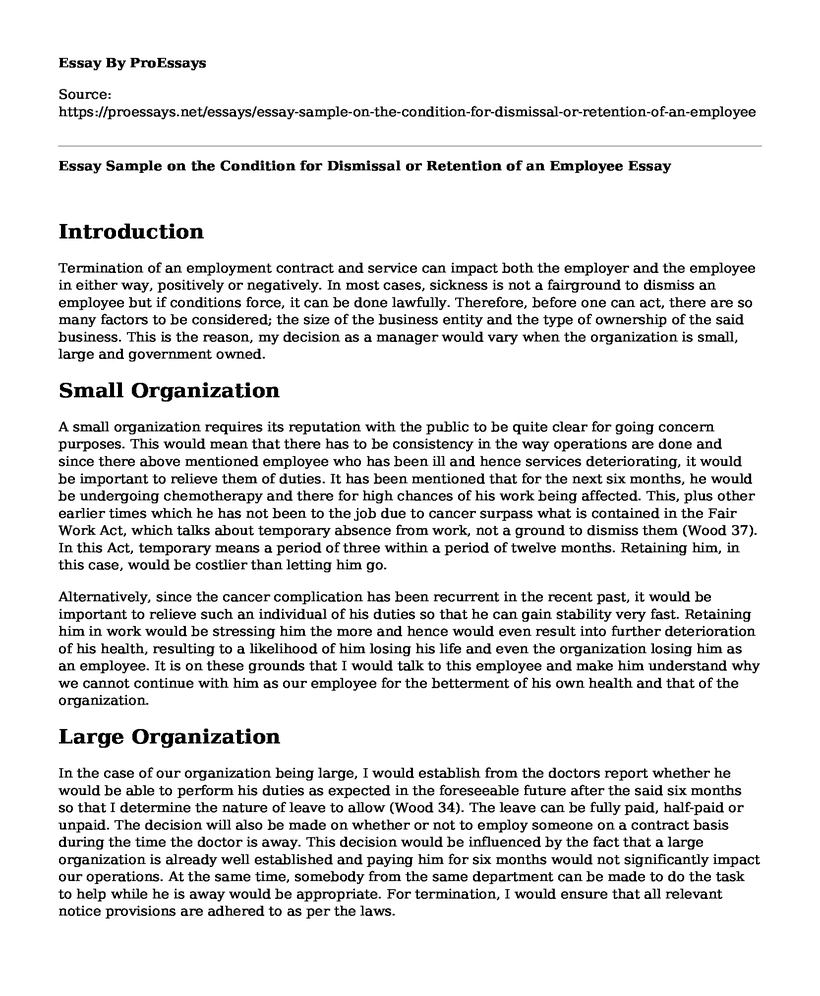Introduction
Termination of an employment contract and service can impact both the employer and the employee in either way, positively or negatively. In most cases, sickness is not a fairground to dismiss an employee but if conditions force, it can be done lawfully. Therefore, before one can act, there are so many factors to be considered; the size of the business entity and the type of ownership of the said business. This is the reason, my decision as a manager would vary when the organization is small, large and government owned.
Small Organization
A small organization requires its reputation with the public to be quite clear for going concern purposes. This would mean that there has to be consistency in the way operations are done and since there above mentioned employee who has been ill and hence services deteriorating, it would be important to relieve them of duties. It has been mentioned that for the next six months, he would be undergoing chemotherapy and there for high chances of his work being affected. This, plus other earlier times which he has not been to the job due to cancer surpass what is contained in the Fair Work Act, which talks about temporary absence from work, not a ground to dismiss them (Wood 37). In this Act, temporary means a period of three within a period of twelve months. Retaining him, in this case, would be costlier than letting him go.
Alternatively, since the cancer complication has been recurrent in the recent past, it would be important to relieve such an individual of his duties so that he can gain stability very fast. Retaining him in work would be stressing him the more and hence would even result into further deterioration of his health, resulting to a likelihood of him losing his life and even the organization losing him as an employee. It is on these grounds that I would talk to this employee and make him understand why we cannot continue with him as our employee for the betterment of his own health and that of the organization.
Large Organization
In the case of our organization being large, I would establish from the doctors report whether he would be able to perform his duties as expected in the foreseeable future after the said six months so that I determine the nature of leave to allow (Wood 34). The leave can be fully paid, half-paid or unpaid. The decision will also be made on whether or not to employ someone on a contract basis during the time the doctor is away. This decision would be influenced by the fact that a large organization is already well established and paying him for six months would not significantly impact our operations. At the same time, somebody from the same department can be made to do the task to help while he is away would be appropriate. For termination, I would ensure that all relevant notice provisions are adhered to as per the laws.
On the contrary, since it has been reported some time back and is the situation at the moment, of his inability to perform, I would dismiss. By law, it is expected that an employee who might still be productive in the line of duties might not be expelled (Wood 31-32). However, when doing this, it would be proper if I give him time to respond to some questions and at the same time offer suggestions on the next cause of action.
However, if it is government-owned business are usually for service provision and not for profits. This is so because, even regarding employee payments, grants from the governments would be used for payments (Boheim and Thomas 22-23). Moreover, since this employee is one of the people being served by the government, I would tolerate and contain him for as long as he wants to be retained and work. This decision would be influenced by the fact that employment laws are very relaxed in the public sector compared to the private sector in which our organization belongs.
Conclusion
With all these different scenarios, employee absence and hence termination of duties is a very complex and sensitive issue in a work environment. It would thus be important that an employer makes efforts to ensure that employers are accommodated but if this cannot be the case, due and correct process has to be followed to avoid claims of unfair and unlawful dismissal. It would thus be proper if decisions to retain or dismiss be done case-to-case rather than adopting and applying a laid down procedure for the situations as it would be offensive in the long run.
Works Cited
Boheim, Rene, and Thomas Leoni. "Firms' Sickness Costs and Workers' Sickness Absences." 2014.
Wood, Gregory. "Workers, Management, and the Right to Smoke during World War II." Cornell University Press, 2017.
Cite this page
Essay Sample on the Condition for Dismissal or Retention of an Employee. (2022, Nov 01). Retrieved from https://proessays.net/essays/essay-sample-on-the-condition-for-dismissal-or-retention-of-an-employee
If you are the original author of this essay and no longer wish to have it published on the ProEssays website, please click below to request its removal:
- Dangerous Consumption: Is the Consumer or the Company to Blame?
- Sun City Public Relations Campaigns Paper Example
- Physician-Health System in Rural Canada Paper Example
- Analyzing the Core Competences of Pepsico Marketing Essay
- Unions in America: An Evolutionary Journey - Essay Sample
- Essay Sample on 3 Essential Corporate Policies: Cultivating a Culture of Inclusion
- Essay on Green Products and Consumer Behavior: Understanding Recent Trends in the Marketplace







